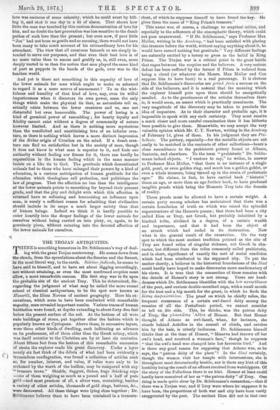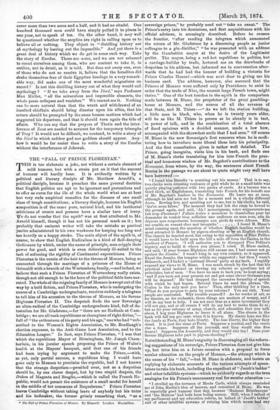THE TROJAN ANTIQUITIES.
THERE is something humorous in Dr. Schliemann's way of deal- ing with the great Trojan controversy. He comes down from the clouds, from the speculations about the Sunrise and the Sunset, in the most literal way, to the earth. Solvitur fodiendo, he seems to have said to himself, and to have set about digging accordingly, not without attaining, as even the most confirmed sceptics must allow, a most remarkable success. His first step was to fix upon the probable site of the ancient Troy. This he determined, dis- regarding the judgment of what may be called the more recent school of classical antiquarians, to be the spot now known as Hissarlik, the Ilium Novum of ancient geography. Here his ex- cavations, which seem to have been conducted with remarkable sagacity, soon revealed important results. Various traces of human habitation were found, at depths extending to about forty-five feet below the present surface of the soil. At the bottom of all were rude buildings of stone, put together after the fashion which is popularly known as Cyclopean. Above these, in successive layers, were three other kinds of dwelling, each indicating an advance on its predecessor, all of them older than the Greek colony, which was itself anterior to the Christian era by at least six centuries. About fifteen feet from the bottom of this remarkable succession of strata the explorer made his great discovery. Under a layer nearly six feet thick of the debris of what had been evidently a tremendous conflagration, was found a collection of articles such as, for number, interest, and value, if value were only to be reckoned by the worth of the bullion, may be compared with any "treasure trove." Shields, daggers, dishes, huge drinking-cups —one of them weighing as much as a pound and a half of pure gold—and most precious of all, a silver vase, containing, besides a variety of other articles, thousands of gold rings, buttons, &c., were discovered. All these things were lying close together ; Dr. Schliemann believes them to have been contained in a treasure-
chest, of which he supposes himself to have found the-key. He gives them the name of "King Prism's treasure."
This name was, of course, a challenge to sceptical critics, and especially to the adherents of the atmospheric theory, which could not pass unanswered. "If Dr. Schlieruann," says Professor Max Miiller, writing in the Academy, "had been satisfied with placing this treasure before the world, without saying anything about it, he would have earned nothing but gratitude." Very different feelings are naturally excited by a heresy so gross as the belief in King Priam. The Trojan war is a critical point in the great battle that rages between the sceptics and the believers. A very serious defeat has been suffered by the former if Priam is reduced from being a cloud (or whatever else Messrs. Max Muller and Cox suppose him to have been) to a real personage. It is obvious that Dr. Schliemann's discoveries are prima facie a success on the side of the believers, and it is natural that the meaning which the explorer himself puts upon them should be energetically assailed. As to the genuineness of the articles themselves there is, it would seem, an assent which is practically unanimous. The very magnitude of the discovery may be taken to preclude the idea of imposture. As to their character and probable age, it is impossible to speak with any such certainty. They must receive a much closer and more careful examination than it has hitherto been possible to give them. Meanwhile, we may accept the very valuable opinion which Mr. C. T. Newton, writing in the Academy of February 14, gives of them. In his judgment they are Pre- hellenic. The pottery, especially—for the metallic objects are not easily to be matched in the contents of other collections—bears a close resemblance to the prehistoric pottery found at Albano, Santorin, and elsewhere. To the term "prehistoric" Dr. Schlie- mann indeed objects. "I venture to say," he writes, in answer to Professor Max Muller, "that there is no instance of a single gold, pearl, or even golden ring, and much leas a golden goblet, or even a whole treasure, being turned up in the strata of prehistoric ages." He claims, in fact, to have carried back "historic" times an age, or more than an age further back, to have produced tangible proofs which bring the Homeric Troy into the domain of reality.
These proofs must be allowed to have a certain weight. A certain party among scholars has maintained that there was a certain foundation of truth on which was raised the splendid superstructure of the Homeric poems ; that there had been a city called Ilion or Troy, not Greek, but probably inhabited by a kindred tribe, civilised in a degree, of a certain wealth and importance, and that it had been the object of an attack which had ended in its destruction. Now what is the general result of the excavation. On the very spot to which the most ancient tradition pointed as the site of Troy are found relics of singular richness, not Greek in cha- racter, but different from the relics commonly called prehistoric, and in short, significant of exactly the sort of social condition which bad been attributed to the anpposed city. To put the matter shortly, a believer in the historical foundations of the Iliad could hardly have hoped to make discoveries more confirmatary of his views. It is true that the connection of these remains with the details of Homer's story is not strong. There are head- dresses which Dr. Schliemann identifies with the Xgr apoxpi)deihvce of the poet, and curious double-mouthed cups, with a small mouth for the host and a big mouth for the guest, in which he finds the tlicceccZapixisnXX0. The proof on which he chiefly relies, the frequent recurrence of a certain owl-faced deity among the remains of all the Prehellenic period, we cannot consider to tell on his side. This, he thinks, was the patron deity of Troy, the 7Xocuxi:J7ri; 'AOivn of Homer. But that Homer thought of Athene as owl-faced, when, for instance, she stands behind Achilles in the council of chiefs, and catches him by the hair, is utterly ludicrous. Dr. Schliemann himself thinks that at the time of Homer, "Minerva had thrown off her owl's bead, and received a woman's face," though he supposes "that the owl's head was changed into her favourite bird." And is there any good reason for supposing that Athene was, as he says, the "patron deity of the place"? In the lliad certainly, though the women visit her temple with intercessions, she is throughout most determinedly hostile, nor is there any hint of this hostility being the result of an affront received from worshippers. Of the story of the Palladium there is no hint. Homer at leaat could hardly have conceived of her as "the patron deity" Of Troy. One thing is made quite clear by Dr. Schliemann's reaearchea,—that if there was a Trojan war, and if 'key were where he supposes it to have-been, the proportions of both war and city have been vastly exaggerated by the poet. The ancient Ilion did not in that case cover more than two acres and a half, and it had no citadel. One hundred thousand men could have simply pulled it to pieces in one year, not to speak of ten. On the other hand, it may well be questioned whether the sceptics are right in calling upon us to believe all or nothing. They object to "distilling history- out of. mythology by leaving out the impossible." And yet there is a great deal of history which we do get in some such way. Take the story of Exodus. There are some, and we are not ashamed to count ourselves among them, who are content to take it, in outline, not in detail, as it is told. But does not every one, even of those who do not so receive it, believe that the Israelites did shake themselves free of their Egyptian bondage in a very remark- able way, did make one of the most wonderful migrations on record ? Is not this distilling history out of what they would call mythology ? "If we take away from the Iliad," says Professor Max Muller, "all the miraculous and impossible elements, the whole poem collapses and vanishes." We cannot see it. Nothing can be more natural than that the wrath and withdrawal of an insulted chieftain should bring disaster upon his allies, that his return should be prompted by the same human motives which had suggested his departure, and that it should turn again the tide of affairs. Who can say that the prayers of Thetis and the inter- ference of Zeus are needed to account for the temporary triumphs of Troy ? It would not be difficult, we contend, to write a story of the Iliad in which neither god nor goddess should appear. Any- how it would be far easier than to write a story of the Exodus without the interference of Jehovah.



































 Previous page
Previous page